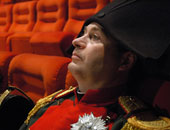
The empire is a decentralised and deterritorialised governmental apparatus progressively taking over the space of the entire world.[1]
The globe as the tangible representation of a space to be occupied makes the process of globalisation inexorable. The issue of movement, the free movement of goods, persons, ideas, images… is not and has never been an ethical problem, only one of possibilities and interests. The earth – which we are all familiar with, knowing all too well that we will not leave it alive – may be deceptive but it is also interesting. Expecting everything from this body and the other bodies on this body: that's the wisdom of our era.[2]
Much along the same lines, modern capital, alive and kicking, is developing through its five avatars: goods, money, text, image and notoriety.[3]
The problem our modern societies were faced with had to do with creating stable forms of relations making sure that the adventures of industry, commerce, science, art would not depend so much on external factors, the risks caused by bad luck, nature, negligence, barbarianism – or, in other words, from the alien, violent and wild.
The idea of a world order came to nothing. It was inevitable.
How can we re-present ourselves as identical with our Javan neighbours – a problem which can only be solved if we accept our similarity.
If our politicians dress like our businessmen, they seek to stress their similarity. Mao had his reason for dressing a billion Chinese in the same blue suit he was wearing! And the entire planet is clad in jeans for a reason, too.
Although empire and power each have several different meanings, they are synonyms when they denote “intellectual or moral influence, impact”. This is where we can identify a project of an empire.
In May 1809 Emperor Napoleon’s troops crossed the Danube just outside Vienna to crush the army of Archduke Charles. The battle of Aspern/Essling ensued. 40,000 died within two days. The first hecatombe of modern warfare. Napoleon’s imperial project was imbued with the heritage of the French Revolution, yet it was the Ausrian who sang the Marseillaise on the battlefield. The battle, in which both sides claimed victory, unites all the contradictions of modernity. Napoleon’s empire clashed with the patriotic feelings of the Austrians who confronted the occupier under the banner of Kakania[4]!
Directed and produced by SUPERAMAS
Co-produced/commissioned by : Parc de la Villette dans le cadre des Residences d’Artistes 2008 Paris, France / Buda Kunstencentrum Kortrijk, Belgium / Kaaitheater, Brussels, Belgium / Linz 2009 Cultural Capital of Europe, Austria / Workspace, Brussels, Belgium.
Cooperation with : Choreographic Center CCL Linz, Austria / Centre chorégraphique National de Montpellier, programme hors-séries, France / CNEAI, Paris, France / wp zimmer, Antwerp, Belgium / Le Cru 100% CHAMPAGNE, Austria.
With the support of : City of Vienna, Austria / Ministry of Education, Art and Culture, Austria / Direction Régionale des Affaires Culturelles d'Ile-de-France, Ministère de la Culture et de la Communication, France.
With : Roch Baumert, Alix Eynaudi, Davis Freeman, Magda Loitzenbauer, Ariane Loze, Jamal Mataan, Anna Mendelssohn, Diederik Peeters, Faris-Endris Rahoma, Rachid Sayet and Superamas
Empire (Art & Politics)
(DSL/Cable recommended)